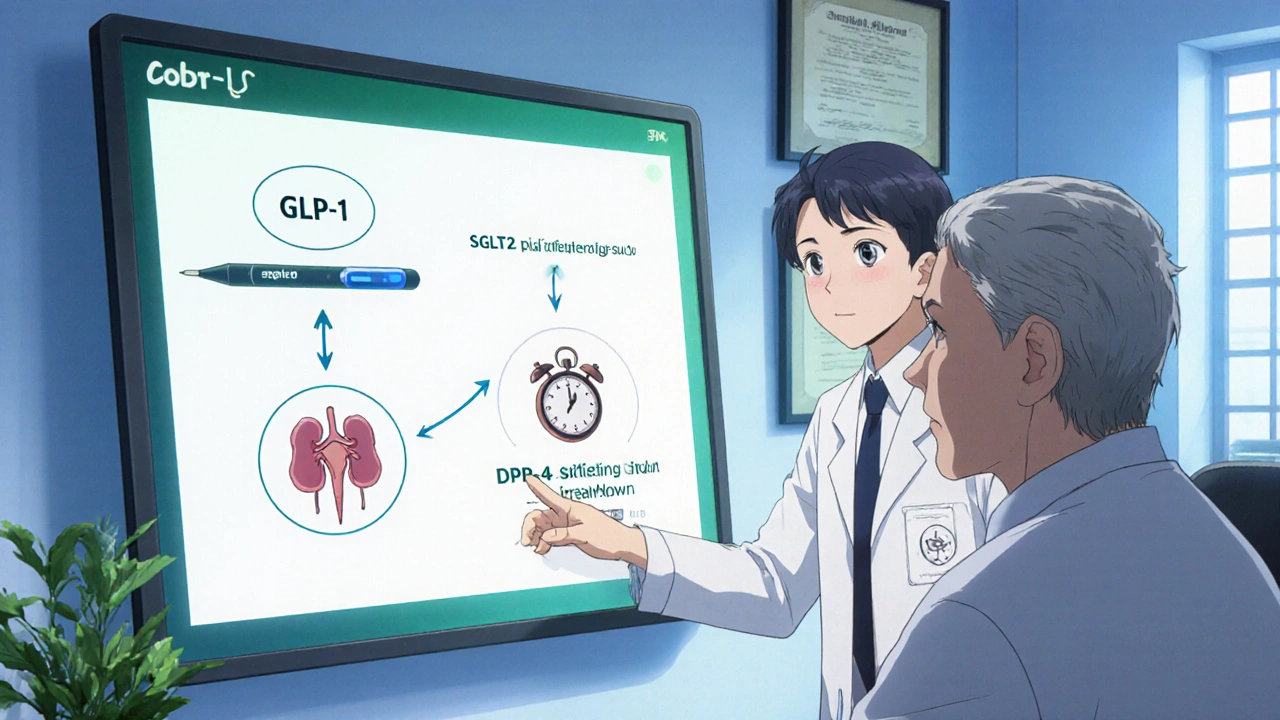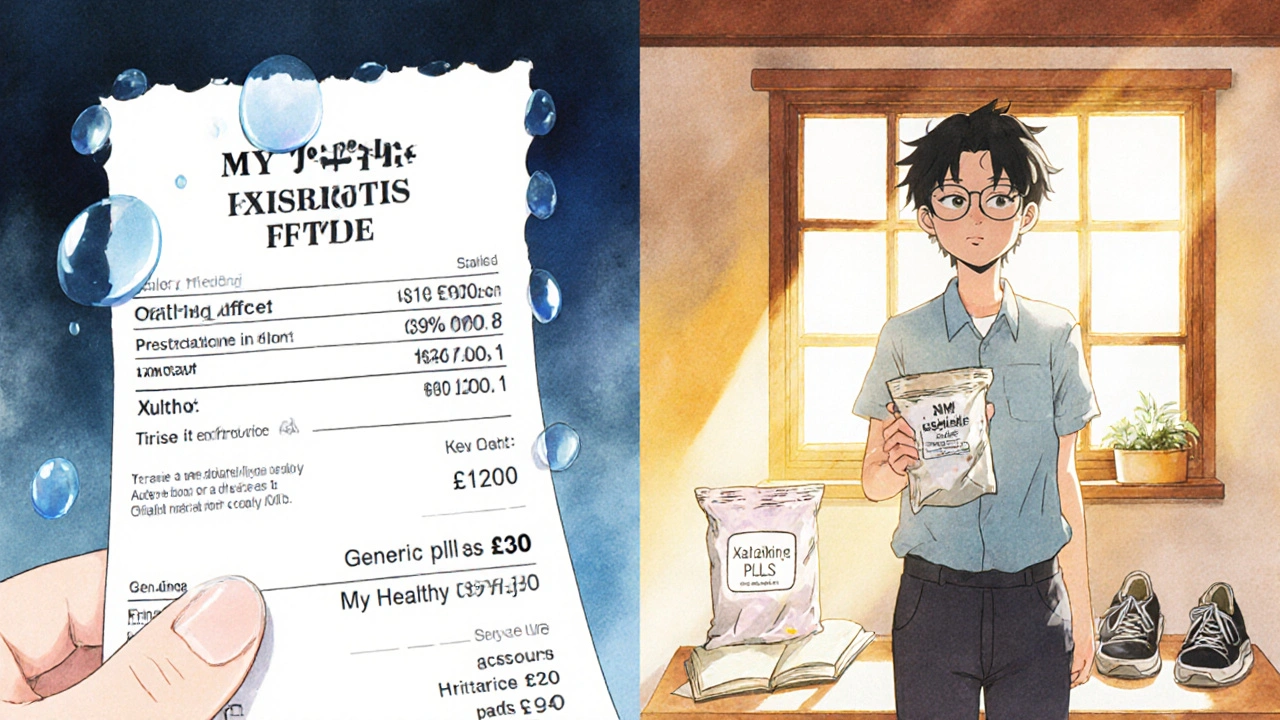Diabetes Treatment Comparison Tool
Find Your Best Treatment Option
Answer a few questions about your priorities to get personalized treatment recommendations based on the latest diabetes management options.
What matters most to you?
Select your top priorities. You can choose up to 3 options.
Personalized Treatment Recommendation
Select at least one priority to see your personalized recommendation.
Key Treatment Options
| Option | Weight Effect | Low Blood Sugar Risk | Monthly Cost (UK) | Administration |
|---|---|---|---|---|
| Glucophage Trio | Weight gain possible | High (due to glimepiride) | £50–70 | One pill daily |
| Metformin + GLP-1 | Significant weight loss | Low | £90–120 | Injection weekly |
| Metformin + SGLT2 | Mild weight loss | Low | £30–50 | One pill daily |
| Metformin + DPP-4 | Neutral | Very low | £40–60 | One pill daily |
| Separate pills | Weight gain possible | High | £25–35 | Two to three pills daily |
Glucophage Trio is a fixed-dose combination pill used to manage type 2 diabetes. It contains three active ingredients: glimepiride, metformin, and voglibose. Each works differently to lower blood sugar, making it a powerful option for people who need more than one medication but want to simplify their routine. But is it the best choice for you? Many people wonder if there are better, cheaper, or safer alternatives - especially if they’re struggling with side effects or cost.
How Glucophage Trio Works
Glucophage Trio combines three drugs that target different parts of how your body handles sugar:
- Glimepiride is a sulfonylurea. It tells your pancreas to make more insulin, helping lower blood sugar after meals.
- Metformin reduces sugar production in your liver and improves how your body uses insulin. It’s often the first drug doctors prescribe for type 2 diabetes.
- Voglibose slows down how fast your gut breaks down carbs. This means sugar enters your bloodstream more slowly, avoiding big spikes after eating.
This triple approach can be very effective - especially for people whose blood sugar stays high despite taking just metformin. But it’s not without risks. Common side effects include stomach upset, low blood sugar (hypoglycemia), and weight gain. Some people also report bloating or gas from voglibose.
Why People Look for Alternatives
People switch from Glucophage Trio for several reasons:
- Side effects: Nausea, diarrhea, or low blood sugar can be hard to manage daily.
- Cost: Combination pills like this are often more expensive than buying the drugs separately - especially if you’re paying out of pocket.
- Flexibility: If your doctor needs to adjust one component (say, increase metformin but stop voglibose), you can’t do that with a fixed-dose pill.
- Effectiveness: Some people still don’t reach their target HbA1c levels even on Glucophage Trio.
That’s why many patients and doctors explore other combinations or newer medications.
Alternative 1: Metformin + GLP-1 Agonists (like Semaglutide or Liraglutide)
One of the most popular alternatives today is pairing metformin with a GLP-1 receptor agonist. These drugs - such as semaglutide (Ozempic, Wegovy) or liraglutide (Victoza) - work by mimicking a gut hormone that helps your body release insulin only when blood sugar is high. This reduces the risk of low blood sugar.
They also slow digestion, reduce appetite, and often lead to weight loss. In clinical trials, people on metformin plus semaglutide lost an average of 6-10% of their body weight over a year. That’s more than what most people lose on Glucophage Trio.
Downsides? GLP-1 drugs are injected, not pills. They can cause nausea, especially at first. And they’re expensive - often over £100 per month in the UK without insurance.
Alternative 2: Metformin + SGLT2 Inhibitors (like Empagliflozin or Dapagliflozin)
Another strong option is combining metformin with an SGLT2 inhibitor. These drugs - such as empagliflozin (Jardiance) or dapagliflozin (Forxiga) - make your kidneys flush out extra sugar through urine. They’re not insulin-dependent, so they rarely cause low blood sugar when used alone.
They also lower blood pressure, reduce heart failure risk, and help with weight loss. In studies, people on dapagliflozin lost about 2-3 kg over 6 months. They’re also linked to slower kidney decline in people with early kidney damage from diabetes.
Side effects? More frequent urinary tract or yeast infections. Some people report increased thirst or needing to pee more often. These are usually mild and improve over time.

Alternative 3: Metformin + DPP-4 Inhibitors (like Sitagliptin or Linagliptin)
If you want a pill-only option with fewer side effects than Glucophage Trio, consider metformin plus a DPP-4 inhibitor. Drugs like sitagliptin (Januvia) or linagliptin (Trajenta) help your body keep using its own insulin longer by blocking an enzyme that breaks it down.
They’re weight-neutral - meaning they don’t cause weight gain or loss. Low blood sugar risk is very low unless combined with sulfonylureas. They’re also gentle on the stomach.
But they’re not as powerful as GLP-1 or SGLT2 drugs. On average, they lower HbA1c by about 0.5-0.8%, compared to 1-1.5% with GLP-1 drugs. They’re also often more expensive than older generic drugs.
Alternative 4: Splitting Glucophage Trio into Separate Pills
Before switching to a completely new drug, consider simply splitting Glucophage Trio into its individual components. Buy metformin, glimepiride, and voglibose separately.
Why? You gain control. If your blood sugar drops too low, your doctor can cut the glimepiride dose without touching the others. If bloating from voglibose is a problem, you can stop it and add something else. And in many cases, buying generics separately is cheaper than the combo pill.
In the UK, metformin 500mg costs around £2 for a 28-day supply. Glimepiride 1mg is about £4. Voglibose isn’t widely available on the NHS but can be imported privately for around £15-20 per month. Combined, you might pay less than £30/month - compared to £50-70 for Glucophage Trio.
Alternative 5: Newer Triple Combos (like Xultophy or Trijardy XR)
There are newer fixed-dose combinations that might be worth considering:
- Xultophy combines insulin degludec (a long-acting insulin) with liraglutide. It’s for people who need insulin but want to avoid multiple daily shots.
- Trijardy XR combines empagliflozin, metformin, and linagliptin in one pill. It’s newer, FDA-approved, and available in some private UK clinics.
These are powerful but expensive. Xultophy can cost over £120/month. Trijardy XR isn’t yet widely available on the NHS. They’re usually reserved for people who haven’t responded to other treatments.

Which Alternative Is Best for You?
There’s no one-size-fits-all answer. Here’s how to think about it:
| Option | Weight Effect | Low Blood Sugar Risk | Cost (Monthly UK Estimate) | Administration |
|---|---|---|---|---|
| Glucophage Trio | Weight gain possible | High (due to glimepiride) | £50-70 | One pill daily |
| Metformin + GLP-1 (e.g., semaglutide) | Significant weight loss | Low | £90-120 | Injection weekly |
| Metformin + SGLT2 (e.g., dapagliflozin) | Mild weight loss | Low | £30-50 | One pill daily |
| Metformin + DPP-4 (e.g., sitagliptin) | Neutral | Very low | £40-60 | One pill daily |
| Separate pills (metformin + glimepiride + voglibose) | Weight gain possible | High | £25-35 | Two to three pills daily |
If you want to lose weight and don’t mind injections, go for GLP-1. If you’re worried about heart or kidney health, SGLT2 inhibitors are a top choice. If you want to keep costs low and avoid injections, splitting the combo pill might be your best move.
What Your Doctor Will Ask Before Switching
Your doctor won’t just switch you because you want to. They’ll check:
- Are your kidneys working well? (SGLT2 drugs need good kidney function)
- Do you have a history of pancreatitis? (GLP-1 drugs are avoided if you do)
- Are you prone to yeast infections? (SGLT2 drugs can make this worse)
- Can you afford the new medication? (Some aren’t covered by NHS)
- Are you taking other drugs that might interact? (Like certain antibiotics or diuretics)
Don’t be surprised if they suggest a blood test or a glucose monitor check before making a change.
When to Stick With Glucophage Trio
It’s not always the worst choice. You might want to stay on it if:
- You’re doing well - your HbA1c is under 7%, and you have no side effects.
- You’re on a tight budget and can’t afford newer drugs.
- You prefer taking one pill over multiple.
- You’ve tried other options and they didn’t work or caused worse side effects.
There’s no shame in sticking with what works. Many people do.
What to Do Next
If you’re thinking about switching:
- Write down why you want to change - side effects? cost? weight gain?
- Check your current HbA1c level. Know your numbers.
- Look up the cost of alternatives on NHS prescriptions or private pharmacies.
- Make a list of questions for your doctor: "Is there a cheaper option?", "Will this help me lose weight?", "What are the risks?"
- Don’t stop or switch without talking to your healthcare provider. Suddenly stopping glimepiride can cause dangerous blood sugar spikes.
Managing type 2 diabetes isn’t about finding the "best" drug. It’s about finding the right fit for your body, your life, and your budget. Glucophage Trio is one tool. There are others - and you deserve to use the one that works best for you.
Is Glucophage Trio better than taking the three drugs separately?
It depends. Glucophage Trio simplifies your routine by combining three pills into one. But taking them separately gives you more control. If you need to adjust one ingredient - like lowering glimepiride to avoid low blood sugar - you can’t do that with the combo pill. Separately, they’re often cheaper too, especially if you use generics. But if you forget pills, the combo might help you stay on track.
Can I buy Glucophage Trio on the NHS?
Glucophage Trio is not routinely prescribed on the NHS in the UK. It’s considered a specialist medication and usually only prescribed if other combinations haven’t worked. Most people get the individual drugs - metformin and glimepiride are widely available. Voglibose is rarely stocked in UK pharmacies and may need to be imported privately.
Do any alternatives cause weight loss?
Yes. GLP-1 agonists like semaglutide and liraglutide cause significant weight loss - often 5-10% of body weight. SGLT2 inhibitors like dapagliflozin and empagliflozin cause mild weight loss, usually 2-4 kg over six months. Glucophage Trio and DPP-4 inhibitors typically don’t cause weight loss and may even lead to slight gain.
Is voglibose safe long-term?
Voglibose is generally safe for long-term use. It doesn’t affect the liver or kidneys. The main side effect is bloating or gas, which usually improves after a few weeks. It’s not linked to low blood sugar on its own. But because it’s not widely used in Western countries, long-term data beyond 5-7 years is limited compared to metformin or SGLT2 drugs.
What’s the cheapest way to manage type 2 diabetes?
The cheapest approach is usually metformin alone, or metformin plus glimepiride if needed. Both are generics and cost under £5/month on the NHS. If you need more control, splitting Glucophage Trio into its parts (metformin, glimepiride, voglibose) can still be cheaper than the combo pill. Avoid newer drugs like GLP-1s unless necessary - they’re effective but expensive.


Comments
Glucophage Trio? More like Gluco-Propaganda. Big Pharma doesn't want you knowing you can buy each pill separately for less than a latte. Voglibose? That's an Indian drug they banned in the US because it actually WORKS. They'd rather you take $120 injections so you're chained to their system forever. Wake up people - this isn't medicine, it's a luxury subscription.
While the comparative pharmacokinetic profiles of the constituent agents are presented with commendable clarity, one must exercise caution in extrapolating cost-effectiveness metrics derived from private-market pricing structures to publicly funded healthcare systems. The NHS does not reimburse fixed-dose combinations lacking NICE approval, rendering the proposed cost comparisons potentially misleading.
Okay but have you SEEN the side effects of GLP-1s? I tried semaglutide and it was like my stomach became a sentient being that hated me. I cried in a Target parking lot because I couldn't eat a protein bar. Also, the injection pen looks like a sci-fi weapon. I miss my little white pill.
Metformin + SGLT2 inhibitors? That's just the pharmaceutical industry's latest scheme to profit off diabetic complications. Kidneys flushing sugar? That's not healing - that's dumping toxins. They're turning your body into a filtration system. And don't get me started on how they're using 'heart failure risk reduction' as a marketing hook. This is not medicine. This is corporate manipulation disguised as science.
Just wanted to add something real for people reading this - if you're on Glucophage Trio and can't afford it, ask your pharmacist about the individual generics. Metformin is dirt cheap, glimepiride too. Voglibose might need a special order, but some Indian pharmacies ship it to the US for under $15/month. I was paying $65 for the combo, now I pay $28 and I can tweak doses if I feel shaky. Also, if you're having bloating from voglibose, try taking it with food - it cuts the gas way down. You're not alone in this. Talk to your doc, but also talk to other patients. Reddit saved my life.
People are so lazy they want one pill to fix everything. You think diabetes is a math problem? No it's a moral failure. You eat too much sugar you get fat you get sick. No magic pill fixes that. Glimepiride makes you fat? Good. Maybe you'll learn. GLP-1s? That's just chemical denial. Stop chasing shortcuts. Eat less. Move more. Stop blaming Big Pharma. Your pancreas isn't broken - your discipline is.
Let’s be honest - Glucophage Trio is for people who don’t read the literature. The real elite? They’re on metformin, berberine, and time-restricted eating. Voglibose? That’s a third-world workaround. Meanwhile, in Switzerland, they’re using alpha-lipoic acid with NAD+ boosters and intermittent fasting protocols. You’re fighting with kitchen-sink combos while the rest of us are optimizing cellular metabolism. It’s not about pills - it’s about epigenetic discipline.
Interesting how the article frames cost as the main barrier - but never mentions that the real cost is the loss of autonomy. When you take a fixed-dose combo, you surrender control. You become a statistic in a clinical trial. You don’t adjust. You don’t experiment. You just swallow. And then you wonder why you feel like a zombie. The real alternative isn't another drug - it’s your own body. Listen to it. Stop outsourcing your health to a pill.
There’s no best drug. There’s only your life. What time do you wake up? What do you eat? Who do you talk to? Diabetes isn’t a chemical equation - it’s a story. Glucophage Trio might be your chapter. Or maybe it’s metformin and walks at dawn. Or SGLT2 and coffee without sugar. The pill doesn’t save you. You do. Just don’t forget to breathe while you’re taking it.